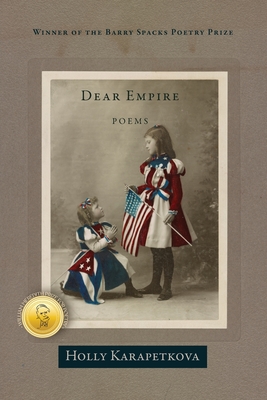"The poems of Holly Karapetkova do not ask for forgiveness. They willingly tackle issues of race and explore ideas associated with the anatomy of whiteness. Here is a collection that is personal as well as historical. Karapetkova writes with a contagious honesty. Her poems describe an American mirror we should not turn away from. Karapetkova's biblical references are a reminder that there is always goodness at the center of her work." -E. Ethelbert Miller, writer and literary activist "For the moments, months, and centuries when we don't know our own faces, these poems might be a cure. Dear Empire is a mirror we desperately need. These poems show us histories and violence some choose not to see. This mirror shows us George Washington's true face, it shows us a train carrying migrants fleeing violence, it shows us history we erased, the lynched humans we documented on postcards. This mirror warns us, with biblical seriousness, that not seeing creates more than blindness. It allows a lie. Holly Karapetkova's poems help us ask questions, they make us brave, they invite us to see. Do not look away from the beauty and power in these poems." -Joseph Ross, author of Raising King and Crushed & Crowned "If the story of America were a Bible, a testament of creation, exile, rules for life, and acculturation, and if, instead of parables and origin stories, it told the history of lynchings and genocides, but from the point of view of the white bystander, you would eventually come to this-it would inevitably be this book-Dear Empire-translated, in effect, by a poet, into the language of poetry, and using as its prophets James Baldwin and Ta-Nehesi Coates. Behind all of this, Holly Karapetkova has written a tour de force: a tender but deeply candid volume which seeks to de-colonize not the country but the self, stripping off the sticky layers of old personal debts and regrets, our fairy tales and illusions, the ghosts of our idols, and our historical atrocities, until what is left is "the space/ between the spaces" where an opening silence and not unproductive emptiness shows us finally where and what are." -David Keplinger, author of Ice: Poems "In Dear Empire, it is history that Holly Karapetkova addresses-and would have us address. History is a cabinet in a great room filled with mirrors and relics, some made "of ivory, cow teeth, slave teeth." It is thus the story of slavery, lynching, cyclical dispossessions. And history is the story of what happened, regardless of<






